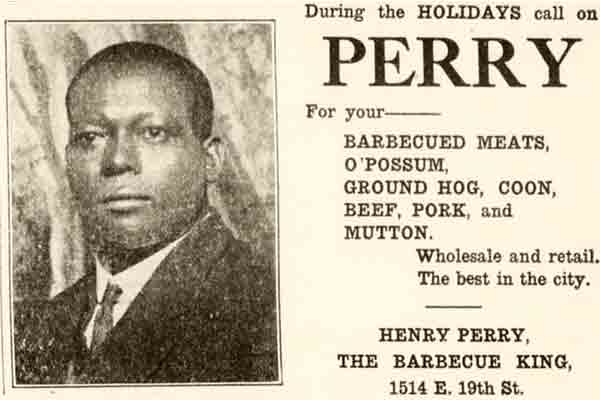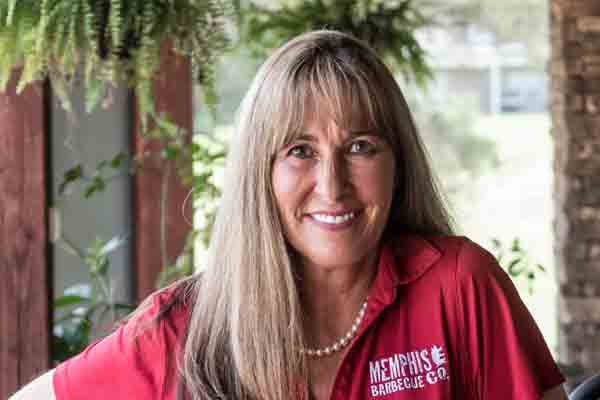American BBQ History: Pioneering Pitmasters and Restaurateurs
American BBQ history is a vibrant tapestry woven by diverse contributors, from pioneering pitmasters to cultural historians, inventors, and current influencers whose stories have shaped its flavors, techniques, and culture.
This first article in our series on American BBQ history highlights key pitmasters and restaurateurs who have left an indelible mark on American BBQ history, ensuring inclusivity and depth.
From the smoky pits of Kansas City to the bustling streets of Charleston, these individuals have made American BBQ history a cultural institution.
Henry Perry: Shaping American BBQ History in Kansas City
Imagine a bustling Kansas City street in 1908, where the aroma of hickory-smoked meats wafts from a humble cart, drawing crowds to Henry Perry’s first BBQ venture. Born in 1877 in Shelby County, Tennessee, Perry moved to Kansas City in 1907, starting as a porter before turning to barbecue. By 1908, he was selling smoked meats from a cart in the Garment District, later opening Perry’s Barbecue in the 1920s at 19th and Vine.
His innovative use of hickory and oak, paired with a spicy, tomato-based sauce, defined Kansas City BBQ’s signature sweet, thick profile. This style is distinct for its versatility in serving beef, pork, mutton, and even wild game like raccoon or opossum. Perry’s open-pit smoking, a nod to Southern traditions, catered to a diverse clientele, reflecting Kansas City’s cultural melting pot and advancing American BBQ history.

Perry’s mentorship was pivotal, training Arthur Bryant, who would carry forward his legacy, and Charlie Bryant, among others. This fostered a lineage of African American pitmasters. His generosity—often giving food to those in need—made him a community staple, earning him the title “Father of Kansas City BBQ.”
Despite facing racial and economic challenges, Perry’s business thrived, serving presidents and celebrities. This cemented Kansas City as a BBQ capital in American BBQ history. His influence persists in the city’s 100+ BBQ restaurants and festivals like the American Royal. Recognized with a 2011 Barbecue Hall of Fame induction, Perry’s legacy underscores African American contributions to American BBQ history, blending innovation with tradition. His story remains a cornerstone of American BBQ history.
“Henry Perry didn’t just cook meat; he built a community around smoke and sauce.” — BBQ Historian
Did You Know? Perry’s original sauce recipe, with its spicy tang, inspired Kansas City’s iconic sweet BBQ flavor!
Quick Tip for Home Cooks: To replicate Perry’s style, mix tomato paste, molasses, and cayenne for a versatile sauce that works on beef or pork—adjust heat to taste for family-friendly results.
Rodney Scott: Champion of Whole Hog BBQ
Picture a South Carolina night, where the glow of a burn barrel lights up Rodney Scott’s pit, the sizzle of whole hog BBQ uniting families over tangy vinegar sauce. Born in Philadelphia but raised in Hemingway, South Carolina, Rodney Scott grew up in a family steeped in BBQ tradition. By age 11, he was helping at Scott’s Bar-B-Que, a roadside stand started by his parents in 1972. Taking over in 2011, he expanded the legacy, opening Rodney Scott’s Whole Hog BBQ in Charleston in 2017, followed by locations in Birmingham and Atlanta, enriching American BBQ history.

Scott’s technique, rooted in Pee Dee region traditions, involves smoking whole hogs for 12 hours over hardwood charcoal. He uses a burn barrel to create coals, then mops with a spicy vinegar-based sauce—a method tracing back to African American and Native American influences. His commitment to whole hog BBQ, a labor-intensive craft, earned him a 2018 James Beard Award for Best Chef: Southeast, making him a modern icon in American BBQ history.
His 2021 cookbook, Rodney Scott’s World of BBQ, shares recipes and stories, preserving South Carolina’s heritage. Scott’s influence extends beyond cooking; he mentors young pitmasters, particularly women and minorities. He engages communities through events like his annual Pig Pickin’. His Charleston restaurant, featured on Chef’s Table: BBQ, draws global visitors, amplifying whole hog BBQ’s cultural significance in American BBQ history.
Despite commercialization debates, Scott’s authenticity—rooted in family and tradition—resonates, as seen in X posts like #WholeHogBBQ. His story, blending resilience and innovation, continues to shape American BBQ history, ensuring its soulful legacy endures.
“Whole hog is my family’s story—12 hours of smoke for one moment of joy.” — Rodney Scott
Did You Know? Scott’s burn barrel method, using live oak, echoes 18th-century BBQ practices!
Quick Tip for Home Cooks: For smaller cuts, apply Scott’s vinegar mop every 30 minutes during the last hour of cooking to achieve that signature tangy crust without a full hog setup.
Aaron Franklin: Mastering Central Texas BBQ
Envision a line stretching around an Austin block, where BBQ enthusiasts wait hours for Aaron Franklin’s legendary brisket. This is a testament to his mastery of Central Texas BBQ and its place in American BBQ history.
Born in 1977 in Bryan, Texas, Franklin grew up around his parents’ BBQ joint, sparking his passion. Starting with a trailer in 2009, he and his wife, Stacy, opened Franklin Barbecue in 2011. Bon Appétit named it America’s best BBQ that year. His focus on brisket, smoked 12–16 hours over post oak with a simple salt-and-pepper rub, redefined craft BBQ. This earned a 2015 James Beard Award for Best Chef: Southwest.

Franklin’s book, Franklin Barbecue: A Meat-Smoking Manifesto, details his meticulous process. It covers everything from wood selection to meat trimming, influencing pitmasters worldwide and American BBQ history.
His restaurant, a pilgrimage site, draws global visitors, with lines forming at dawn. Franklin’s media presence, including BBQ with Franklin on PBS and Chef’s Table: BBQ, amplifies his impact. Though some critique his commercialization for long wait times and high prices. His innovations, like custom-built smokers, and advocacy for craft BBQ have elevated Texas BBQ’s global profile. This blends tradition with precision in American BBQ history.
Franklin’s influence extends to mentoring, with former staff opening their own joints, spreading Central Texas style. His X engagement, like #TexasBBQ posts, connects with fans. While his Austin festival, Hot Luck, celebrates BBQ culture. Despite debates, Franklin’s dedication to quality—sourcing prime brisket and tending fires daily—ensures his legacy as a BBQ titan. He shapes the craft’s modern era with unparalleled precision in American BBQ history.
“Brisket is about patience and smoke—every cut tells a story.” — Aaron Franklin
Did You Know? Franklin’s brisket lines inspired a 2015 documentary, BBQ with Franklin!
Quick Tip for Home Cooks: Wrap your brisket in butcher paper at the 160°F internal temp to speed up cooking and retain moisture, mimicking Franklin’s “Texas crutch” for foolproof results.
Tootsie Tomanetz: The First Lady of Texas BBQ
Picture a pre-dawn Texas morning, where 89-year-old Tootsie Tomanetz tends glowing pits at Snow’s BBQ. Her hands deftly manage brisket as the aroma fills the air, contributing to American BBQ history.
Born in 1935 in Lexington, Texas, Norma Jean “Tootsie” Tomanetz began her BBQ journey in 1966 at City Meat Market. She mastered Central Texas-style brisket, ribs, and sausage. Joining Snow’s BBQ in 2003, she helped it earn the title of Texas’s best BBQ from Texas Monthly in 2008. This was a rare feat for a small-town joint.
Tomanetz’s technique uses post oak and a simple salt-pepper rub. It produces tender, smoky meats, smoked 8–12 hours at low temperatures. Her work ethic—starting at 2 a.m. on Saturdays—earned her James Beard Award semifinalist nods in 2018 and 2020. This is a testament to her skill in a male-dominated field and her role in American BBQ history.
Featured on Chef’s Table: BBQ in 2020, her story of balancing BBQ with a 40-year career as a school custodian inspired global audiences. It highlights women’s resilience in BBQ. At Snow’s, Tomanetz mentors younger pitmasters, sharing knowledge gained over decades. Her community engagement, like serving locals and tourists, fosters BBQ’s communal spirit.
Her influence, amplified by X campaigns like #WomenInBBQ, challenges gender stereotypes. It proves age and gender are no barriers. Despite physical demands, Tomanetz’s dedication—rooted in tradition and love for BBQ—continues to shape Central Texas BBQ and American BBQ history. She is a living legend whose legacy endures through every smoky bite.
“BBQ is about heart, not just heat—keep the fire steady and the love strong.” — Tootsie Tomanetz
Did You Know? Tootsie’s Saturday shifts at Snow’s draw BBQ pilgrims from across the globe!
Quick Tip for Home Cooks: Tootsie’s simple rub (equal parts salt and pepper) enhances natural meat flavors—apply generously and let rest overnight for deeper penetration.
Melissa Cookston: The Winningest Woman in American BBQ History
Imagine the heat of a Memphis in May competition, where Melissa Cookston’s precision and passion secure her seventh world BBQ championship. This earns her the title “Winningest Woman in Barbecue” and a spot in American BBQ history.
Born in Mississippi, Cookston began competing in 1996, mastering ribs, pork shoulder, and whole hog. In 2011, she opened Memphis BBQ Company in Horn Lake, Mississippi, expanding to multiple locations. She showcases her expertise in Memphis-style BBQ with dry-rubbed ribs and tangy sauces.

Inducted into the Barbecue Hall of Fame in 2017, Cookston’s seven Memphis in May titles include three consecutive whole hog wins (2010–2012). This sets a high bar in competitive BBQ and American BBQ history.
Her cookbooks, like Smokin’ in the Boys’ Room, and TV appearances on BBQ Pitmasters and Chopped share her techniques. They cover spice blends to smoking times, inspiring aspiring pitmasters, especially women. Her mentorship, through workshops and online tutorials, fosters inclusivity. It challenges the male-dominated BBQ world, as seen in her X posts with #WomenInBBQ.
Cookston’s restaurants emphasize quality, sourcing local meats and crafting house-made sauces. Her competition success—over $1 million in prize money—underscores her skill. Despite criticism for commercial ventures, her authenticity, rooted in Southern tradition, resonates. This makes her a role model.
Her influence continues to shape BBQ culture and American BBQ history. It blends competition prowess with community engagement, ensuring women’s voices are heard in the smoky world of BBQ.
“BBQ is my canvas—every rib is a brushstroke of flavor.” — Melissa Cookston
Did You Know? Cookston’s seven Memphis in May wins make her a BBQ legend!
Quick Tip for Home Cooks: Cookston’s dry rub secret: Toast spices before blending to unlock aromas, then apply 24 hours ahead for competition-level bark.
Marie-Jean: A Pioneer in Early American BBQ History
In the 1840s Arkansas, Marie-Jean, an enslaved woman, stood over a smoky pit. Her skill in barbecuing earned her a path to freedom and a foundational role in American BBQ history. (Note: Historical records primarily refer to her as Marie-Jean; “Mary John” appears to be a variant or error in some sources.)
Known for “superintending” large BBQ events, she catered for wealthy patrons. She saved earnings to buy her freedom for $800, equivalent to about $28,000 today. After emancipation, she continued as a pitmaster, a rare feat for a woman in a male-dominated era. This challenged gender and racial norms.
Her story, documented in Adrian Miller’s Black Smoke, highlights early African American women’s contributions to American BBQ history. While details of her techniques are sparse, accounts suggest she mastered slow-cooking pork. She likely used hickory or oak, common in Southern BBQ. Her 1840 Pine Bluff barbecue was legendary, serving hundreds with skill honed under oppressive conditions.
Marie-Jean’s resilience, turning a labor-intensive craft into liberation, underscores BBQ’s deeper cultural significance. It served as a tool for survival and empowerment. Though less celebrated than modern pitmasters, her legacy resonates in the stories of African American women in BBQ, like Desiree Robinson. Her influence, though not widely recorded, paved the way for future generations. As seen in X discussions like #BlackBBQ.
Marie-Jean’s story is a testament to the unsung heroes whose smoky pits laid the foundation for American BBQ history. It blends grit and flavor in a transformative era.
“Her pit was her freedom—each fire a step toward liberty.” — BBQ Historian
Did You Know? Marie-Jean’s $800 freedom fund was earned through her BBQ mastery!
Quick Tip for Home Cooks: Honor early pioneers by slow-roasting pork shoulder over hickory at 225°F, basting with apple cider vinegar to mimic historical moisture-locking methods.
C.B. Stubblefield: Innovating Texas BBQ
Picture a lively Austin night in the 1980s, where C.B. “Stubb” Stubblefield’s BBQ joint hums with music and the scent of his tangy sauce. This adds to American BBQ history.
Born in 1931 in Navasota, Texas, Stubblefield learned cooking as an Army mess sergeant during the Korean War. In 1968, he opened Stubb’s Bar-B-Q in Lubbock, a hub for music legends like Willie Nelson. Moving to Austin in 1986, his restaurant became a cultural landmark, blending BBQ with live music.
Stubb’s signature sauce, a smoky, tangy blend of tomato, vinegar, and spices, gained fame after a 1985 Late Night With David Letterman appearance. This led to nationwide distribution. His BBQ—brisket, ribs, and sausage smoked over pecan wood—reflected Texas traditions, emphasizing African American influences. Inducted into the Barbecue Hall of Fame in 2019, Stubb’s legacy endures through his sauce brand. Now a staple in grocery stores, and his Austin venue, hosting concerts.
Despite financial struggles, Stubb’s generosity—often feeding the homeless—made him a beloved figure. His influence lies in merging BBQ with music and community, shaping Austin’s cultural identity and American BBQ history. X posts with #TexasBBQ celebrate his legacy. They highlight his role in making BBQ a cultural connector, blending African American heritage with entrepreneurial spirit.
“BBQ and music—two ways to feed the soul.” — C.B. Stubblefield
Did You Know? Stubb’s sauce debuted on national TV with David Letterman!
Quick Tip for Home Cooks: Stubb’s pecan wood smoke adds subtle sweetness—use it for ribs and finish with his tangy sauce for a balanced, crowd-pleasing glaze.
Desiree Robinson: Matriarch Preserving Memphis BBQ
Envision a Memphis afternoon, where Desiree Robinson’s Cozy Corner BBQ serves soulful ribs. Her warmth is as inviting as the smoky aroma, upholding American BBQ history.
Co-founding Cozy Corner in 1977 with her husband, Raymond, Desiree took over after his 2001 death. She maintained its status as a Memphis institution. Known for ribs, Cornish hens, and a unique BBQ spaghetti, her restaurant reflects African American BBQ traditions. It blends tangy sauces with dry rubs.
In 2020, Desiree became the first African American woman and living African American inducted into the Barbecue Hall of Fame. This was a historic milestone in American BBQ history. Her commitment to quality—sourcing local meats and slow-smoking over hickory—draws locals and tourists. Cozy Corner is featured in Southern Living and Food Network. Her community engagement, like hosting church groups, fosters BBQ’s communal spirit. As seen in X posts with #BlackBBQ.
Despite challenges like rising costs, Desiree’s resilience—running the business into her 70s—ensures Cozy Corner’s legacy. Her influence highlights women and African Americans in BBQ, inspiring figures like Melissa Cookston. Desiree’s story, rooted in family and tradition, underscores BBQ’s role as a cultural anchor. It preserves Memphis’s smoky heritage in American BBQ history.
“BBQ is love on a plate—every bite brings us together.” — Desiree Robinson
Did You Know? Cozy Corner’s BBQ spaghetti is a Memphis original!
Quick Tip for Home Cooks: For Robinson’s BBQ spaghetti, toss al dente pasta in pulled pork sauce with cheddar—bake briefly for a comforting, fusion side that feeds a crowd economically.
John Lewis: Bridging Regions in American BBQ History
Picture a Charleston evening, where John Lewis’s pit at Lewis Barbecue churns out Central Texas-style brisket. This bridges Southern traditions and expands American BBQ history.
From El Paso, Texas, Lewis started at La Barbecue in Austin in 2012. He opened Lewis Barbecue in Charleston in 2015. His family’s BBQ lineage dates to the 1800s, with his great-grandfather smoking meats. Known for brisket, smoked 12 hours over post oak, Lewis blends Texas simplicity with Southern hospitality.
His influence lies in mentoring pitmasters and expanding Central Texas BBQ eastward. His custom smokers, designed for efficiency, reflect innovation. While his Charleston restaurant draws crowds, featured in Eater. Lewis’s X engagement, like #TexasBBQ posts, connects with fans. This ensures his legacy as a bridge between BBQ regions, rooted in tradition and skill in American BBQ history.
“BBQ is about roots—mine run deep from Texas to the Carolinas.” — John Lewis
Did You Know? Lewis’s family has smoked BBQ since the 1800s!
Quick Tip for Home Cooks: Lewis’s post-oak smoke works indoors—use a stovetop smoker with chips for brisket experiments, infusing Southern charm into weeknight meals.
Leonard Heuberger: Founding Memphis Legacy
Imagine a 1920s Memphis street, where Leonard Heuberger’s Pit Barbecue sells pulled pork sandwiches for five cents. This lays the foundation for a city’s BBQ legacy in American BBQ history.
Opening in 1922, Leonard’s became one of Memphis’s oldest BBQ joints. It evolved into a drive-in by the 1950s. Known for pulled pork and ribs, smoked over hickory with a tangy sauce, it set a standard for Memphis BBQ. Under Dan Brown’s ownership since 1993, Leonard’s remains a staple, featured in Southern Living.
Heuberger’s influence lies in establishing Memphis as a BBQ hub. His early restaurant shaped the city’s culinary identity. His legacy, celebrated on X with #MemphisBBQ, underscores BBQ’s role in community and tradition. It is a testament to early 20th-century pitmasters in American BBQ history.
“A nickel sandwich started a Memphis legend.” — BBQ Historian
Did You Know? Leonard’s was Memphis’s first BBQ drive-in!
Quick Tip for Home Cooks: Heuberger’s tangy sauce staple: Simmer ketchup, vinegar, and brown sugar for 30 minutes—perfect for pulled pork sliders on a budget.